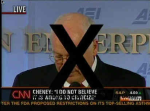There has been a lengthy "commercial" entry at boingboing about InternetTV called "miro kicks JOOSTs butt". Miro is the newly named "democracy player" (or interfaced video RSS bittorrent client) implying that miro will dethrone JOOST and is generally just soo much better. While I am all for open everything I can not follow this thought as I see one major shortcoming with miro.
no real streaming.
But until we get to that lets have a first short look at where TV on the internet is now and where it has come from.
I have been looking for a viable video publishing solution on the internets since I have been using the internets. I soon figured to give a real competition to TV over the air you have to have a medium that is similarly spontaneous instant, easy, unobtrusive and "lazy". With the advent of blogging and RSS feeds the "easy" part and partially the "lazy" part could be solved but what was always missing i this approach is the instant gratification of switching on a TV and get some programming - I did say instant right?
As some RSS feeds are near instant I still believe that "realtime" TV programming has its merrit and that can not be accomplished with RSS also the buffer time between programming can get long with slower connections (read majority of world population has less then 1Mbit connections) and interrupt from this seamless TV experience most people are used to.
Now you can do streaming since about 100 million internet years but for the small "videopodcast" producer this is a horrendous expensive proposition as it either means setting up shop with your own server and paying not only housing rental but also the bandwidth cost of a streaming solution where each and every person uses bandwidth for each and every time they are watching your feed or getting into a contract with one of the few good streaming video providers - you figure out their prices by you own.
That leaves as the only alternative distributed streaming - an area I have been tracking for a few years and have gotten frustrated with to say the least. There was peercast - a solution that was about to take off when it lost steam with the only supported formats beeing ogg and wmv. No mpg4 support and no easy install process and the two remaining formats beeing rather "shaky" to say the least disqualified this product. I wrote about Peercast before.
The other solution that was beeing trumpeted was the bittorrent streaming protocol - since bittorrent got bought up by the MPAA associates talk about this has completely died down - and if you are a conspiracy theorist you might want to believe that the bittorrent streaming protocol was the big fish in the bundle - even to just never have it released onto the market. In the end an open source open internet uncontrollable P2P streaming protocol would skew the power-pyramid in this world heavily toward the base. Now Bittorrent.Inc is asking for producers of TV programs to apply to get on their IPTV service when it launches "later this year". I get into that below.
This year came Project Venice - now better known as JOOST and I got a very early invite to be part of their beta testing. I was cheering at first because what I saw was the day of light of bringing true internet TV to the masses - I was blinded. Yes even early incarnations of JOOST worked flawelessly streaming distributed. The technology seemed great. Wikipedia writes the following:
The current version of the software is based on XULRunner and the audio management re-uses the ZAP Media Kit. The peer to peer layer comes from the Joltid company, which also provided the peer to peer layer of Skype. The video playback utilizes the CoreCodec, CoreAVC H.264 video decoder.
XULRunner - great open source .
ZAP Media Kit - great also open source
but what the freaking dang is JoltID? Well its the company that generates great code to license (skype protocol anyone) it to big companies - and this is where it all broke down for me. Because with a "commercial" layer underneath this whole thing had a big weak point - it can be controlled by an outside party - and as we see in the current incarnation it is FULLY controlled by an outside party. What do I mean? Well there is someone controlling the content - a censor so to say - that means this technology - while great – is in no good spirit and even so you can "apply" to become a joost channel the normal democratic internet rules where EVERYONE is a publisher does not apply. As a business model this is understandable but it has serious consequences when you look at it from the eyes of an open internet without barriers. Oh and to make matters worse they DRMed the shit out of those TV shows and track what you watch - great just what the big content producers want - but neither the free internet loving peeps nor the small independent programmers - and why do I need InternetTV if its the same old junk that I can watch over their airwaves?
The same problem applies to the forthcoming Bittorrent streaming protocol - as this company is ruled bye the MPAA now you will see only "quality" DRMed closed "old school" TV programming.
All this is different with miro of course as it is based on open protocols (as open as the normal bittorrent protocol is now I guess) and everyone can publish anything - hence the name "demcracy player". Its basically a fancy video RSS reader with bittorrent functionality - while this is great to save bandwidth for small publishers - it also tends that small publishers have not that much bandwidth need to absolutely dive into it too deeply and its NOT STREAMING heck its not even "play as you download" also it leaves to much "work" to the lazy couch potatos wanting an easy "just watch a sitcom/nature/techshow now" button.
Streaming is absolutely necessary to make internetTV have any chance fighting the 98% traditional TV penetration in this society. People want it ->all<- ->instant<- ->now<- even me and I am a computer geek who hasn´t watched tv for the last eight years. I never leave my computer on over night except if I have to render something for work so the "download over night" approach doesnt appeal to me - also if I see something interesting I want to know about it right then - the next day I probably have been moving on and lost interest or don´t have the time or whatever.
So I would say neither program wins - the one is closed and defies the spirit of the open internet - the other one is just not close enough to TV to gain the ciritical mass needed to make it succesfull on a grand scale.
What is really needed - and in the next 6 month that is otherwise JOOST will have an impenetrable market power - is the following:
1.) Fully open P2P decentralized (no tracker no server please) streaming protocol.
2.) a way to integrate the programming into webpages
3.) a way to "download while you watch" so you can later give movies to friends or watch it on an iPod or whatever
4.) Make an RSS API that lets other users (not only the publisher) make Programming feeds. This got to be the best Web2.100 application I can think of! Have people produce content and other people comb through the content to make nice TVstreams about certain topics - maybe even with custom "TV presenters" in between.
5.) make it encrypted from the beginning. If you are truly a "democracy" player you need to let people broadcast encrypted secure untraceable programming from their home.
5.) wrap it all into an open source nicely code documented framework that can easely be wrapped into gui applications - do not try to make the gui application yourself as it likely sucks if you are a team of programmers without interface building knowledge and just "get a friend graphic designer" on board to to make that eyecandy flashy everything moves interface for you.
Until that has happened we - the people on the indy publisher side and on the consumer/watcher side - will have to do with classic RSS streams and try to ignore the easiness and instantaneousness (that is really a word :) of JOOST for the moment.
Good thing JOOST is having such a hungry sucking bigbangeyecandyflashy obstrusive interface that it probably fail just because of that ;) oh and it has commercials which are starting to be annoying as well.
So to get back to the boingboing article - I do not like the boingboing stuff for praising applications because they "sit in the board of advisers". They should have a critical view on everything and miro is not set to deliver any kind of InternetTV revolution. Both solutions are in no way satisfying - sorry.
more links:
P2P Streaming overview (tribler.org)
An Experimental Analysis of Joost Peer-to-Peer VoD Service (uni-goettingen.de)
Get democracy - ahm - miro player (getmiro.com).

















 A great little site I happened to wander across today is called "maschinen esses sich selber auf" (machines will eat itself). And its simply such a great idea that I want to help promote the thing. To make it short: You tell a little bot program (a program that works by itself) a website that takes personal data (mostly all do this for profit and to save you adress and later sell it or make you "genuine offers", they all seem to want to have the biggest archive of adresses with the most information about the individuals). That is A LOT OF WEBSITES today. Then the bot (and the other 1000+ bots on the side) visits this website and put in its fake personal data, swamping the database with unusable data streams that to clean takes to much times and renders a whole database totally useless. Well thats the ambiguous plan. Right now the bots are hungry they have not enough websites to eat, because that needs to be fed to them so they do not cause to much traffic running through the pages looking for the "forms" of the big datacenters.
A great little site I happened to wander across today is called "maschinen esses sich selber auf" (machines will eat itself). And its simply such a great idea that I want to help promote the thing. To make it short: You tell a little bot program (a program that works by itself) a website that takes personal data (mostly all do this for profit and to save you adress and later sell it or make you "genuine offers", they all seem to want to have the biggest archive of adresses with the most information about the individuals). That is A LOT OF WEBSITES today. Then the bot (and the other 1000+ bots on the side) visits this website and put in its fake personal data, swamping the database with unusable data streams that to clean takes to much times and renders a whole database totally useless. Well thats the ambiguous plan. Right now the bots are hungry they have not enough websites to eat, because that needs to be fed to them so they do not cause to much traffic running through the pages looking for the "forms" of the big datacenters.  I need to get something out of my head.
I need to get something out of my head.